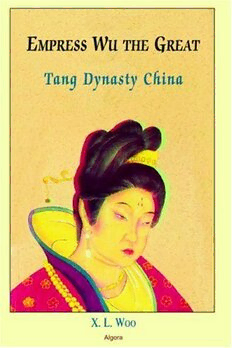
Empress Wu the Great PDF
184 Pages·2008·1.864 MB·English
Most books are stored in the elastic cloud where traffic is expensive. For this reason, we have a limit on daily download.
Preview Empress Wu the Great
Description:
Empress Wu was stunning in her beauty, in her ruthless elimination of rivals (including sons and daughters), and, most important, in her discernment. She was esteemed for appointing capable officials throughout the realm, and she implemented reforms that improved standards of higher education, gave some status to women, and democratized the recruitment of candidates for official posts by eliminating the requirement that they be nominated by someone within the establishment. Europe and Great Britain have had many sovereign queens in the course of history. In ancient China, there was none of that. Only one Empress ever ruled China in her own name Empress Wu. Given her startling performance in a world of deadly intrigue and shifting loyalties, Wu is still respected as an effective and clear-sighted ruler. Related in an easy-reading style, the facts in the book are derived from China s classic historical record the Zizhitongjian (meaning History is a mirror to help rule ), which was written by a courtier in Song Dynasty, the very next dynasty after the Tang Dynasty. Beginning in AD 617, the narrative traces the rise of Wu s father from humble bean-curd dealer to army officer and friend of the Emperor, her own arrival at age 13 as a concubine to the Emperor, and the brilliant exploitation of opportunities by which she attained the throne. Other empresses had ruled China for a time while their husbands were weak and their sons were young; Wu did the same from 665 to 690. But Wu achieved a higher status than any woman before or since when she declared her own dynasty in 690 and ruled directly for another 15 years. Readers are treated to some of the flavor of life inside the capital, then at Xi' an, the eastern tip of the great Silk Road (now known in international tourism as the site of the famous Terracotta Warriors). In those years the Chinese ruler held sway far to the south, into Indochina, and westward as far as today's Kyrgyzstan. Brief descriptions indicate the tumultuous events unfolding throughout Asia as China vied with Mongol tribes and the Tibetan Empire to establish the map we know today and some of the disputes over boundaries and sovereignty that are still ongoing.
See more
The list of books you might like
Most books are stored in the elastic cloud where traffic is expensive. For this reason, we have a limit on daily download.
